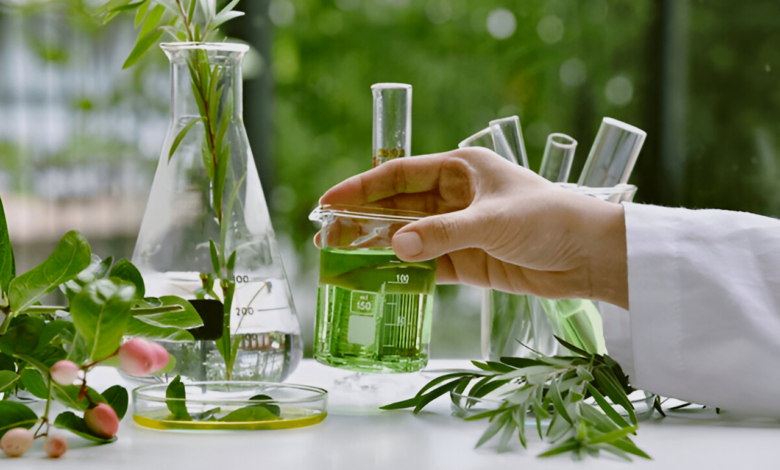Natural vs. Chemical Skincare: What’s Best for Your Skin Type?
Natural vs. chemical skincare: the best approach for your skin type the pros, cons, and how to choose the right products for a radiant complexion.

Natural vs. chemical skincare is a topic that has sparked endless debates among beauty enthusiasts, dermatologists, and skincare brands. With the growing emphasis on clean beauty and the increasing availability of scientifically advanced products, it can be challenging to determine what’s best for your skin type. Natural skincare often appeals to those seeking gentle, eco-friendly options, while chemical-based products are praised for their precision and effectiveness. This article delves into the pros and cons of both approaches, helping you make an informed decision based on your skin’s unique needs. Whether you have dry, oily, sensitive, or combination skin, understanding the differences between natural and chemical skincare is essential for achieving a healthy, radiant complexion.
In the ongoing debate of natural vs. chemical skincare, there is no one-size-fits-all answer. Both approaches have their merits and drawbacks, and the best choice depends on your skin type, concerns, and personal preferences. Natural skincare offers a gentle, eco-conscious option for those who prefer plant-based ingredients, while chemical skincare provides targeted solutions for specific skin issues. Ultimately, the key to healthy skin lies in understanding your skin’s needs and choosing products that align with your goals. By combining the best of both worlds—natural ingredients for nourishment and chemical formulations for precision—you can create a skincare routine that works harmoniously with your skin type. Remember, consistency and patience are essential, regardless of whether you lean toward natural or chemical skincare.
Natural vs. Chemical Skincare: A Comprehensive Guide
The skincare industry has evolved significantly over the years, offering a wide range of products that cater to diverse skin types and concerns. However, the choice between natural and chemical skincare remains a contentious issue. To make an informed decision, it’s crucial to understand the fundamental differences between these two approaches, their benefits, and potential drawbacks.
What is Natural Skincare?
Natural skincare refers to products made primarily from plant-based ingredients, such as herbs, oils, and extracts. These products are often free from synthetic chemicals, parabens, sulfates, and artificial fragrances. Advocates of natural skincare argue that it is gentler on the skin and less likely to cause irritation or long-term damage. Ingredients like aloe vera, coconut oil, sea butter, and tea tree oil are commonly found in natural skincare products, each offering unique benefits such as hydration, anti-inflammatory properties, and antibacterial effects.
One of the main advantages of natural skincare is its eco-friendliness. Many natural skincare brands prioritize sustainable sourcing, biodegradable packaging, and cruelty-free practices, making them an attractive option for environmentally conscious consumers. Additionally, natural products are often rich in vitamins, antioxidants, and essential fatty acids, which nourish the skin and promote a healthy complexion.
However, natural skincare is not without its limitations. Some natural ingredients can be allergenic or irritating, especially for those with sensitive skin. For example, essential oils, while derived from plants, can cause reactions in some individuals. Furthermore, natural products may have a shorter shelf life due to the absence of synthetic preservatives, and their effectiveness can vary depending on the quality and concentration of ingredients.
What is Chemical Skincare?
Chemical skincare, on the other hand, relies on scientifically formulated ingredients to address specific skin concerns. These products often contain synthetic compounds like retinoids, hyaluronic acid, salicylic acid, and peptides, which are designed to penetrate the skin deeply and deliver targeted results. Chemical skincare is praised for its ability to treat acne, hyperpigmentation, wrinkles, and other skin issues with precision and efficiency.
One of the key benefits of chemical skincare is its consistency and reliability. Because these products are developed in controlled environments, their potency and effectiveness are often backed by scientific research and clinical trials. For example, retinoids are proven to stimulate collagen production and reduce the appearance of fine lines, while hyaluronic acid is renowned for its ability to retain moisture and plump the skin.
Despite their effectiveness, chemical skincare products can sometimes be harsh on the skin, particularly for those with sensitive or reactive skin types. Ingredients like alpha hydroxy acids (AHAs) and beta hydroxy acids (BHAs) can cause redness, peeling, and irritation if not used correctly. Additionally, some chemical skincare products may contain preservatives or fragrances that can trigger allergies or sensitivities.
Choosing the Right Skincare for Your Skin Type
Dry Skin
For individuals with dry skin, hydration is the top priority. Natural skincare products containing ingredients like sea butter, jojoba oil, and avocado oil can provide deep nourishment and restore the skin’s moisture barrier. However, chemical skincare options like hyaluronic acid and glycerin are also highly effective at attracting and retaining moisture. A combination of natural and chemical products may offer the best results for dry skin.
Oily Skin
Oily skin types benefit from lightweight, non-comedogenic products that regulate sebum production without clogging pores. Natural ingredients like tea tree oil and witch hazel have astringent properties that can help control oiliness, while chemical exfoliants like salicylic acid can unclog pores and prevent breakouts. It’s important to avoid overly harsh products, as they can strip the skin of its natural oils and lead to increased sebum production.
Sensitive Skin
Sensitive skin requires gentle, soothing products that minimize the risk of irritation. Natural skincare options like chamomile, calendula, and oatmeal are known for their calming properties. However, some natural ingredients, such as essential oils, can be too potent for sensitive skin. In such cases, chemical skincare products formulated with minimal ingredients and free from fragrances or dyes may be a safer choice.
Combination Skin
Combination skin can be tricky to manage, as it involves both oily and dry areas. A balanced approach that incorporates natural and chemical skincare is often ideal. For example, natural oils like rosehip oil can hydrate dry patches, while chemical exfoliants like glycolic acid can address oiliness and uneven texture.
Aging Skin
Aging skin benefits from ingredients that boost collagen production, improve elasticity, and reduce the appearance of fine lines and wrinkles. Natural options like rosehip oil and green tea extract offer antioxidant protection, while chemical ingredients like retinoids and peptides provide more dramatic anti-aging effects.
The Role of Personal Preferences and Lifestyle
Beyond skin type, personal preferences and lifestyle factors play a significant role in choosing between natural and chemical skincare. For those who prioritize sustainability and eco-friendliness, natural skincare may be the preferred option. On the other hand, individuals seeking fast, visible results may gravitate toward chemical skincare. It’s also worth considering your budget, as natural skincare products can sometimes be more expensive due to the cost of sourcing high-quality ingredients.
Combining Natural and Chemical Skincare
Many skincare experts advocate for a hybrid approach that combines the best of both worlds. For example, you might use a natural cleanser to gently remove impurities, followed by a chemical exfoliant to refine your skin’s texture. Similarly, a natural moisturizer can provide hydration, while a chemical serum targets specific concerns like hyperpigmentation or acne. By blending natural and chemical skincare, you can create a customized routine that addresses your skin’s unique needs.
Common Misconceptions About Natural and Chemical Skincare
There are several misconceptions surrounding natural and chemical skincare that can cloud judgment. One common myth is that natural skincare is always safer and better for the skin. While natural ingredients can be beneficial, they are not inherently superior to synthetic ones. Similarly, the belief that chemical skincare is inherently harmful is unfounded. Many chemical ingredients are rigorously tested and proven to be safe and effective.
Another misconception is that natural skincare is free from chemicals. In reality, everything is made up of chemicals, including water and plant extracts. The distinction lies in whether the ingredients are naturally derived or synthetically produced.
The Importance of Patch Testing
Regardless of whether you choose natural or chemical skincare, patch testing is essential to avoid adverse reactions. Apply a small amount of the product to a discreet area of your skin and wait 24-48 hours to see if any irritation occurs. This step is particularly important for those with sensitive skin or known allergies.
The Future of Skincare
As the skincare industry continues to evolve, the line between natural and chemical skincare is becoming increasingly blurred. Many brands are now offering products that combine natural ingredients with advanced scientific formulations, providing the benefits of both approaches. Additionally, there is a growing emphasis on transparency, with brands disclosing their ingredient sourcing and production processes.
Read More: Top Skincare Trends in 2025: What You Need to Try Now
Conclusion
In the ongoing debate of natural vs. chemical skincare, there is no one-size-fits-all answer. Both approaches have their merits and drawbacks, and the best choice depends on your skin type, concerns, and personal preferences. Natural skincare offers a gentle, eco-conscious option for those who prefer plant-based ingredients, while chemical skincare provides targeted solutions for specific skin issues. Ultimately, the key to healthy skin lies in understanding your skin’s needs and choosing products that align with your goals.
By combining the best of both worlds—natural ingredients for nourishment and chemical formulations for precision—you can create a skincare routine that works harmoniously with your skin type. Remember, consistency and patience are essential, regardless of whether you lean toward natural or chemical skincare. With the right approach, you can achieve a healthy, radiant complexion that reflects your unique beauty.
FAQs
Is natural skincare better than chemical skincare?
Natural skincare is not inherently better; it depends on your skin type and concerns. Natural products are often gentler, while chemical skincare offers targeted solutions.
Can I use both natural and chemical skincare together?
Yes, combining natural and chemical skincare can be effective. For example, use a natural cleanser followed by a chemical exfoliant for balanced results.
Are chemical skincare products safe?
Many chemical skincare products are safe and effective when used as directed. Always patch test and follow the instructions to avoid irritation.
What natural ingredients are best for sensitive skin?
Chamomile, calendula, and oatmeal are gentle natural ingredients suitable for sensitive skin. Avoid essential oils if you’re prone to reactions.
How do I choose between natural and chemical skincare?
Consider your skin type, concerns, and preferences. Experiment with both approaches to find what works best for you.










